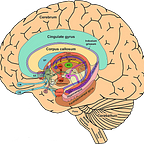UChicago College Essay
Prompt: Vestigiality refers to genetically determined structures or attributes that have apparently lost most or all of their ancestral function, but have been retained during the process of evolution. In humans, for instance, the appendix is thought to be a vestigial structure. Describe something vestigial (real or imagined) and provide an explanation for its existence.
Erendira stumbles into the cave as the buffalo pellet hangs on the curve of her back with hail pounding down relentlessly. At the base of the sheer cliff face, her nose smells the stale, stagnant and musky air as thousands of feet of rock weigh down over her head: home. But, shelter from the hail is not what she looks for.
She sees him, and covering the distance in a couple steps, embraces him tightly. Slowly, their fingers intertwine as their hands clasp together, running their thumbs against one another. The rosy feeling of a sunrise encapsulates her heart, shivering from the electric blood beating through her veins. Passion, lust, and yearning are the emotions oscillating between the two.
As Erendira’s lover touches his thumb to hers, the surge of emotions, memories, and experience unleash into him. Just like the uniqueness of the ridges on her fingerprint, her life story unfolds. He feels the deadened suppressed sorrow of her miscarriage, the hardened soles of her feet from the hundreds of miles she walked across the great plains, and her immediate emotions. He understands who she is and why she is. Completely.
Before the existence of language, before the grunts and squawks of modern language, primeval humans used a more subtle, more emotional form of communication: fingerprints.
As the autumn leaves tumbled down and regrew in their never ending cycle, the melodies of birds and the ribbits of frogs were gradually replaced by the growling of engines and the never ending squawks of humans. Fingerprint’s innate element was lost to history and now its value lies in its physical structure, in how it looks. The lingering effects of the lost power of fingerprints are still seen everywhere: the casual high five, the insincere air kiss, the respectful namaste bow. Businessmen unconsciously shake hands firmly, almost as if to transmit their seriousness and power. Students cover their hands over their hearts during pledges, almost as if the honor and respect would be transferred into their hearts.
With the evolution of speech, writing, and the innovations of Facebook, IMessage, etc, it seems almost paradoxical that there is so much miscommunication within myself and with others compared to Erendira’s time. I attribute this to technology.
Being a part of a distinct generation, I differ from adults as I have only known a world of technology, a way of life for me. This problem permeated so deeply within me that I flash back to a time when I attended a funeral. Though I was young, I was horrified to remember that I fiddled on my IPod for most of the wake: not from a lack of empathy but the desire to remove myself from the grief, removing myself from the inherently painful interactions. Technology was my distraction.
Connected but alone. Somewhere along the line, I got caught up in customizing my life: editing and deleting parts of myself. Social media and technology appealed to me in ways that concealed my vulnerability. I used to think being connected would help me feel less alone, but it was the fact that I did not know how to be alone that made me lonely. Evolutionarily, from Erendira’s time to ours, pain has been an adaptive trait to move humans in the opposite direction. Human relationships and conversations are bountiful but are prone to messiness and exhaustion. As we moved away from the real conversations, we sacrificed relationships for simple connections.
In the end, I don’t want to love a robot, not a phone, not a computer. Taking a step in the right direction, I traded in my hours of social media before bed for early rise runs, alone with my thoughts. As I take steps towards my future, concurrently, I am not afraid to take a step back into history, because who knows what I might find.
(This is a work of creative fiction)
